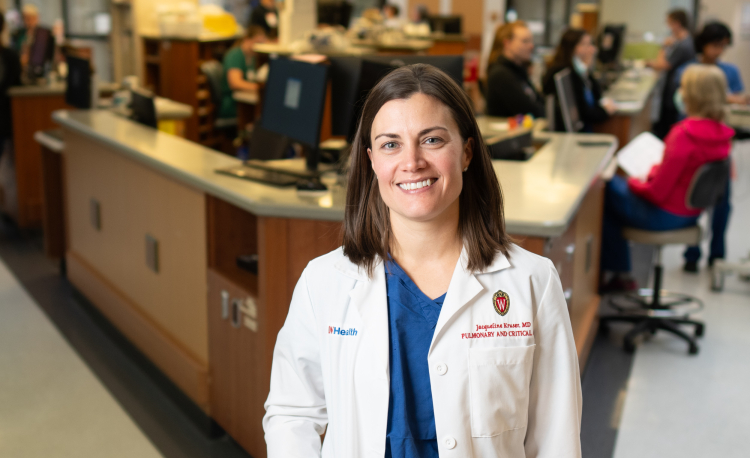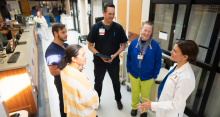Jacqueline Kruser, MD, shows how careful communication leads to better care

Jacqueline Kruser, MD, assistant professor, Allergy, Pulmonary and Critical Care Medicine, helps critical care teams understand the impact of how they communicate.
“We think in language,” says Dr. Kruser. “What words do we use, why do we use them, and what are the implications for the people we work with and the people we care for?”
As she demonstrates in several recent publications, paying attention to communication can lead to meaningful adjustments in how we practice medicine.
Distinguishing clinical and patient needs
In a recent Viewpoint in the Journal of the American Medical Association (JAMA), Dr. Kruser and her co-authors write about how the word “need” is often used by critical care clinicians as shorthand to identify a clinical assessment about illness severity.
For example, “If the patient’s breathing gets any worse, they will need to be intubated,” identifies what the patient lacks and the subsequent action likeliest to produce a positive outcome.
“We can separate our clinical assessment (needing intubation) from the deliberation about whether intubation should be done,” the authors write.
However, when patients and families hear the word “need,” they assume there is only one course of action—with little or no space left for deliberation.
Dr. Kruser instead encourages clinicians to instead use phrases like “What this means is…” and “Can we talk about what to do next?” to frame a discussion about what is acceptable to the patient.
Building a transparent language
Dr. Kruser’s second publication, a study in the Journal of Pain and Symptom Management, examines use of the phrase “goals of care” (GOC) by critical and palliative care teams across 10 focus groups.
The team found that, while each clinician understood the ideal definition of GOC—i.e., to indicate a patient’s broader healthcare goals—the phrase is rarely used in that way.
“What we often really mean [by GOC] is sharing bad news about how a treatment isn’t working, and the patient isn’t getting any better,” Dr. Kruser explains. “It becomes a euphemism for end of life.”
When appropriated as shorthand to convey complex notions quickly, phrases with specific ideal meanings can cloud a patient’s understanding precisely when they need clarity. This can lead to conflict for the patient, family and physician down the road.
Instead of saying "goals of care" as a euphemism, the authors suggest that clinicians should say, more directly, what they mean: "The treatments are not working as we'd hoped, and I am worried this means the patient could die." There may also be a larger need for a language of serious illness that accounts, separately, for clinical functions.

Making deliberate space
In a third paper, published in the Annals of the American Thoracic Society, Dr. Kruser and her co-authors focus on how ICU teams collaborate using something called “transactive” or “collective” memory.
“Everyone on an ICU team has information that is important in its own, specific way to that team member and their role,” explains Dr. Kruser. “This study found, for example, that occupational and physical therapists communicated frequently with patients about what was important to them and their goals.”
Without deliberate space to discuss what the therapists knew or what other members of the team knew, attending physicians could miss out on critically important information that may have better informed the patient’s care plan.
In short, the study asserts, transactive memory systems work best when a team deliberately makes space for communication. This begins with basic recognition of each participant’s role and building a common culture where each, regardless of their level of experience or place in the hierarchy, is comfortable with asserting their specialized knowledge.
“One of the key components of building collective memory is credibility—finding the other people in your collective memory system credible,” Dr. Kruser says.
The human at the center
“There’s a lot of conceptual thinking here,” Dr. Kruser acknowledges. “That’s why we’re trying to break things down into these building blocks of language, to stay grounded and pragmatic.”
After all, it can be frighteningly easy to lose sight of what’s in the middle of all the machines and protocols of medicine.
“How else do we hold onto the human at the center?”
Banner: Jacqueline Kruser, MD, assistant professor, Allergy, Pulmonary and Critical Care Medicine, in the ICU at University Hospital. In part for the work discussed in this article, Dr. Kruser also won the Department of Medicine 2023 Junior Faculty Outstanding Research Award. Credit: Clint Thayer/Department of Medicine.